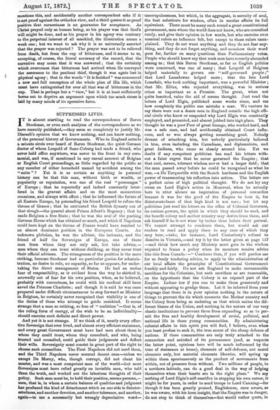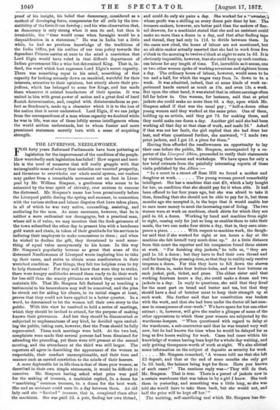SUPPRESSED LIVES.
IT is almost startling to read the correspondence of Baron Stockmar, or even such analyses of the correspondence as we have recently publiahed,—they seem so completely to justify Mr. Disraeli's opinion that we know nothing, and can know nothing, of the personal history of Governments. Who in England outside a minute circle ever heard of Baron Stockmar, the quiet German doctor of whom Leopold of Saxe-Coburg had made a friend, who never held office anywhere, was never to the front in any cere- monial, and was, if mentioned in any casual account of Belgian or English Court proceedings, as little regarded by the public as any member of either household named by accident among the " suite " ? Yet it is as certain as anything in personal history can be that this man, without birth or wealth, or popularity or reputation, was one of the real " personages " of Europe ; that he repeatedly and indeed constantly inter- fered in the gravest affairs and on the most momentous occasions, and always with effect ; that he influenced the future of all Eastern Europe, by persuading his friend Leopold to refuse the throne of Greece ; that he extricated the British dynasty out of that slough—the quarrel about Prince Albert's Regency ; that he made Belgium a free State ; that he was the soul of the pushing German House which has obtained so much, and which if Napoleon could have kept on the throne of France would have reached to an almost dominant position in the European Courts. An unknown plebeian, he was the adviser, the intimate, and the friend of half the Sovereigns of Europe, one of those men from whom they not only ask, but take advice,— men whom they can trust without disliking, as they never trust their official advisers. The strangeness of the position is the more striking, because Stockmar had no particular genius for adminis- tration, no desire to rule, no capacity, so far as appears, for under- taking the direct management of States. He had an undue fear of responsibility, as is evident from the way he shirked it, avowedly out of fear for his own position, when, as he believed, probably with correctness, he could with his medical skill have saved the Princess Charlotte ; and though it is said he was once prepared under difficult circumstances to step forward as Minister in Belgium, he certainly never recognised that visibility is one of the duties of those who attempt to guide mankind. It seems strange that a man so retiring, so free of "ambition "—that is, of the ruling form of energy, of the wish to be an individuality— should exercise such definite and direct power.
And yet it is not strange. If we think of it, nearly every effec- tive Sovereign that ever lived, and almost every efficient statesman, and every great Government must have had men about them in whom they could trust, whom they consulted, and who, being trusted and consulted, could guide their judgments and deflect their wills. Sovereignty mast consist in great part of the right to choose such counsellors. The First Napoleon did not need them, and the Third Napoleon never secured decent ones—unless we except Be Morny, who, though corrupt, did not cheat his master, and was a most competent man of the world—but most Sovereigns must have relied greatly on invisible men, who told them the truth, and worked out the laborious thoughts of their policy. Such men must be, to hold their position, serene persons,— men, that is, in whom a certain balance of qualities and judgment has produced the kind of detachment which on one side is disinter- eetedness, and another devotion, and another tolerance, and another, again—to use a necessarily but wrongly depreciative word—
unscrupulousness, but which, in the aggregate, is serenity of soul, the beat substitute for wisdom, often in secular affairs its full equivalent. There must be many such round a great constitutional government, men whom the world does not know, who are consulted rarely, and give their opinion in few words, but who exercise over nominal rulers an influence felt, but except to those rulers unex- plained. They do not want anything and they do not fear any- thing, and they do not forget anything, and somehow their word goes far, farther on many questions than Parliamentary votes. People who should know say that such men have recently abounded among us ; that this Baron Stockmar, as far as English politics were concerned, was one of many ; that Leopold of Belgium helped materially to govern our "self-governed people ;" that Lord Lansdowne helped more ; that the late Lord Lonsdale, who took nothing important, was a powerful Minister ; that Mr. Ellice, who rejected everything, was in serious crises as important as a Premier. The great, when not quite besotted, value the aid of serene thought. Just read the letters of Lord Elgin, published some weeks since, and see how completely the public can mistake a man. We venture to say there were not a dozen men in England outside the high offi- cial circle who knew or suspected why Lord Elgin was constantly employed, and promoted, and almost jobbed into high place. They thought he was a poor Peer of great lineage, who worked hard, and was a safe man, and had accidentally obtained Court influ- ence, and so was always getting something good. Nobody dreamt of attacking him, but nobody particularly believed in him, even including the Canadians, and diplomatists, and great Indians, who came so closely around him. Yet we doubt if any competent politician has read his letters with- out a faint regret that he never governed the Empire ; that that cool, serene, tolerant wisdom never had a larger field ; that the man passed away before he could be recognised as what he was,—a De Tocqueville with the Scotch hardness and the English power of transmuting his reflection into action. The letters are a perfect mine of high political thought. We do not lay any stress on Lord Elgin's action in Montreal, when he actually bore in utter silence an imputation of personal cowardice because it was for the good of the Empire to bear it, for disinterestedness of that high kind is not rare ; but let any politician just read his letters on the office of Colonial Governor, its curious powers, the spirit in which they should be used, and the benefit colony and mother country may derive from them, and ask himself if he is not wiser by inches than before their perusal. We cannot attempt to condense them, but would ask our readers to read and apply them to any case of which they may hear, —take, for instance, Lord Canterbury's refusal to dissolve in Victoria,—and try it by the letter given at page 127 —and think how much any Ministry must gain in the wisdom required to frame a policy when its members receive advice like this from Canada :—" Continue then, if you will pardon me for so freely tendering advice, to apply in the administration of our local affairs the principles of Constitutional Government frankly and fairly. Do not ask England to make unreasonable sacrifices for the Colonists, but such sacrifices as are reasonable, on the hypothesis that the Colony is an exposed part of the Empire. Induce her if you can to make them generously and without appearing to grudge them. Let it be inferred from your language that there is in your opinion nothing in the nature of things to prevent the tie which connects the Mother country and the Colony from being as enduring as that which unites the dif- ferent States of the Union, and nothing in the nature of our very elastic institutions to prevent them from expanding so as to per- mit the free and healthy development of social, political, and national life in these young communities. By administering colonial affairs in this spirit you will find, I believe, even when you least profess to seek it, the true secret of the cheap defence of nations. If these communities are only truly attached to the connection and satisfied of its permanence (and, as respects the latter point, opinions here will be much influenced by the tone of statesmen at home), elements of self-defence, not moral elements only, but material elements likewise, will spring up within them spontaneously as the product of movements from within, not of pressure from without. Two millions of people, in a northern latitude, can do a good deal in the way of helping themselves when their hearts are in the right place." We say nothing of Lord Elgin's self-sacrifice in stopping his own career, it might be for years, in order to send troops to Lord Canning—for though it has been greatly praised, Englishmen, once aware, as he was aware, with his keen insight, that the Empire was in danger, do not stop to think of themselves—but would rather quote, in proof of his insight, his belief that democracy, considered as a method of developing force, compensates for all evils by the irre- sistibility of the force it can develop ; and his wise observation that, as democracy is only strong when it sees its end, but then is irresistible, the "time would come when foresight would be a disqualification in a statesman." He was in India but a little while, he had no previous knowledge of the traditions of the India Office, yet his outline of our true policy towards the dependent Princes carries at once to the mind a conviction that Lord Elgin would have ruled in that difficult department of Indian government like a wise but determined King. That is, in- deed, the word which best expresses Lord Elgin's secret capacity. There was something royal in his mind, something of that capacity for looking serenely down on mankind, watchful for their interests, attentive to their opinions, but utterly above their pre- judices, which has belonged to some few Kings, and has made them whenever it existed benefactors of their species. It was united in him with great power of action and a great deal of hard Scotch determination, and, coupled with disinterestedness as per- fect as Stockmar's, made up a character which it is to the loss of the nation that it never understood. Lord Elgin, if we can judge from the correspondence of a man whose capacity we doubted while he was in life, was one of those loftily serene intelligences whom the world seldom understands, but to whom fussier and more prominent statesmen secretly turn with a sense of acquiring strength.



































 Previous page
Previous page